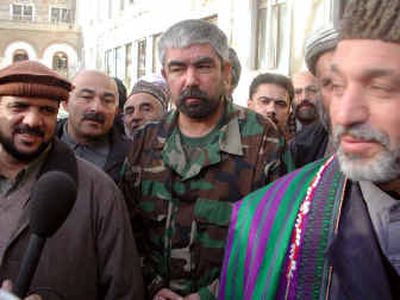Militia leader gets key Afghan post

KABUL, Afghanistan – Afghan President Hamid Karzai has named a powerful militia leader, who has been widely accused of human rights abuses, as his chief of staff for military affairs.
The appointment of Gen. Rashid Dostum, which was made official Tuesday, prompted criticism from human rights advocates who have urged the president to exclude warlords from his government.
“This goes directly against the principle, endorsed by the president in January, that those who abused power in the past should not be given those positions again,” said Patricia Gossman, director of the Afghanistan Justice Project, a nongovernmental group that documents human rights abuses.
Gossman said Dostum, 50, was the most prominent of a series of militia leaders whose appointments alarmed her. “There are very powerful militia members who are now appearing in the police,” she said. “They are changing their uniforms but not their past.”
Khaleeq Ahmed, a spokesman for Karzai, said he could not comment on Dostum’s human rights record.
The ethnic Uzbek strongman is a former pro-communist army officer who has been a fixture on the Afghan scene since the Soviet Union’s 1979 invasion.
In 2001, he helped U.S. and Afghan forces topple the radical Taliban government, then switched to politics and ran an unsuccessful campaign for president against Karzai in the nation’s first-ever national elections last October.
Dostum, who came in fourth in the vote, continues to enjoy substantial support in several northeastern provinces that he has long dominated. But he was also known for repeatedly switching sides during his long and often brutal career.
In 2001, troops under his command were accused of sealing hundreds of Taliban prisoners in transport containers where they suffocated to death, then burying them in mass graves. Dostum has denied the charges.
In January, Dostum narrowly survived an assassination attempt by a suicide bomber in his northern home town, Shebergan. A Taliban spokesman claimed the attack was in retaliation for Dostum’s killing of Taliban fighters.
Although Karzai has given Dostum various posts and titles in the past, relations between the two men often have been rocky.
When Karzai was appointed interim leader of Afghanistan in 2001, Dostum promptly undermined stability by waging a bitter struggle for control of the northeastern provinces with an ethnic Tajik rival, Attah Mohammad. Last April, Karzai sent national army troops to the north to quell fighting by Dostum’s militiamen.